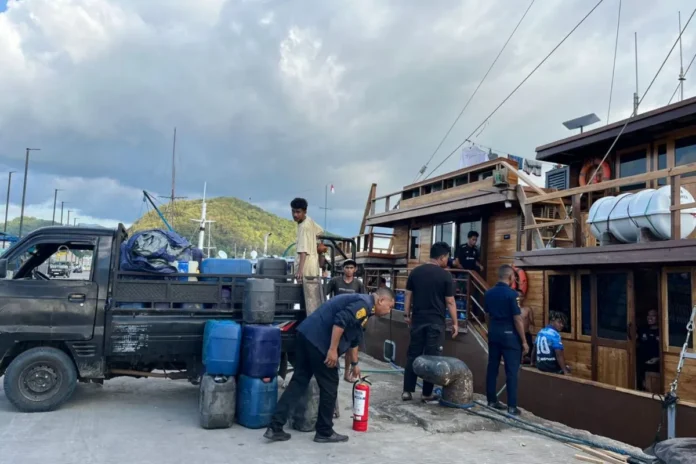To safeguard marine environments amidst growing tourism, mainly from private trip Labuan Bajo charters, the Class III Office of Sea Transportation and Ports Authority (KSOP) in Labuan Bajo has instituted regular bunker inspections at Marina Labuan Bajo. These measures aim to prevent oil spills during refuelling operations and maintain the pristine waters that define the region’s status as a premium holor’s paradise with eco-conscious travellers.
Focused Monitoring During Peak Bunkering Hours
KSOP head Stephanus Risdiyanto explains that refuelling typically takes place in late afternoons, at 17:00 and 17:30 WITA, once the vessels return from excursions. These “peak bunker hours” see an influx of both local and tourist boats requiring diesel, making vigilant oversight essential.
Sequential Permit Checks Guarantee Safety
The inspection protocol commences with the issuance of a “bongkar muat” permit for the transfer of hazardous materials (in this case, fuel) at the port. At the port’s security checkpoint, officials verify that the vessel has valid documentation and assess the amount of fuel on board. They also ensure that essential safety equipment, like portable fire extinguishers, is present before allowing the vessel to proceed.
MSOP personnel, supported by TNI and police officers, perform manual checks on-site. Additionally, every afternoon shift officer completes patrol rounds to oversee ongoing operations, and CCTV systems supplement this monitoring to ensure consistency.
Also read Is Your Rp50 Komodo Coin Hiding Millions in Your Old Piggy Bank?
Fuel Held Pending Final Authorization
Fuel transfers only proceed after full approval and verification have been obtained. If documentation is incomplete, the fuel volume doesn’t match records or safety equipment is not in place, KSOP halts operations. This ensures that no fuel begins flowing until all requirements are met.
Environmental Protections and Legal Protocols
KSOP’s primary mission is the safety of navigation, but environmental stewardship is integral to its mandate. Although they don’t verify fuel legality, KSOP maintains close coordination with police authorities, empowered to investigate any misuse or illicit activity, all within the appropriate legal frameworks.
According to the latest inspections, no oil spills have been detected. Coastal biodiversity remains abundant—corals, reef fish, and marine organisms thrive beneath the marina’s docks. Public-facing displays even showcase underwater life near the pier within the passenger terminal.
Community Appeal for Maritime Cleanliness
Stephanus urges both operators and visitors to maintain marine hygiene. “Let’s jointly protect the cleanliness and tranquility of tourism in Labuan Bajo,” he says. With tourism on the rise—including luxury private charters—the responsibility lies with all stakeholders to preserve these waters.
Why These Inspections Matter
- Environmental Integrity: Bunker spills, even minor ones, can harm coral reefs and disrupt local ecosystems, which are vital to the region’s identity and ecotourism appeal.
- Tourism Confidence: Travellers on private trips to Labuan Bajo or group tours expect clean and safe marine environments, making visible safety measures a valuable part of the destination’s brand.
- Regulatory Compliance: KSOP’s methodical process—encompassing permitting, documentation, and safety checks—ensures that legal and operational standards are consistently upheld.
- Collaborative Oversight: By engaging port authorities, police, military personnel, and port operators, the region maintains a cohesive safety and environmental net.
Moving Forward
KSOP commits to further strengthening bunker oversight and invites stakeholder input to enhance compliance. Should any vessel or crew member violate regulations, the authority pledges to enforce them promptly. Coordinated oversight paired with community involvement ensures Labuan Bajo remains unspoiled and secure.
At Marina Labuan Bajo, KSOP demonstrates leadership through careful bunker inspections. Ensuring a harmonious balance between marine conservation and tourism development. Their commitment sets a benchmark for sustainable practices, showcasing the importance of protecting marine environments while promoting economic growth. This safeguards not only the local industry but also the stunning aquatic landscapes that draw visitors, and supports thriving private trip experiences in Labuan Bajo for the future.






























